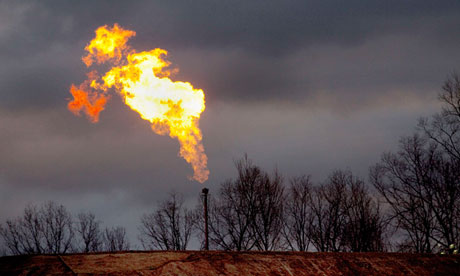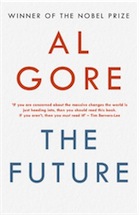The Future by Al Gore – review
Al Gore's alarming new guide to what needs to change in world politics is essential reading

Risking water supplies: a gas flare burns at a fracking site in rural Pennsylvania. Photograph: Les Stone/Reuters
According to reliable reports, the new leadership in Beijing has been reading Alexis de Tocqueville. It's not hard to see why China's elite might look for guidance to the aristocratic French thinker. In his classic text The Ancien Regime and the Revolution (1856), de Tocqueville wrote that the danger of revolution is not greatest in the depths of poverty and despair but when conditions have been improving – especially if some are benefiting far more than others. The relevance of this for China is obvious. The implications for policy are rather less so, since de Tocqueville also warned that for a bad government, the moment of greatest danger comes when it starts to reform. In such circumstances, repression might be a more prudent course of action. This troubling ambiguity could explain why Chinese readers, struggling to decipher the intentions of their rulers, made de Tocqueville's book a national bestseller.
From a parochial British perspective, what might be most significant is the fact that China's rulers are reading de Tocqueville at all. It is difficult to imagine David Cameron devoting any time to a 19th-century thinker. Along with much of the political class, the prime minister seems resistant to the notion that history has anything to teach, and looks for guidance to writers who extol the wisdom of crowds, explain the momentous importance of tipping points or pass on the revelation that humans are social animals – the fleeting nostrums of the airport bookstore. But if our rulers will not read the classics then they must read Al Gore, who, after eight years of reading and thinking, has produced a guide for the politically perplexed that will surely endure.
Gore starts with six drivers of change, which together make the world fundamentally different from the way it was even a few decades ago: a more globalised economy, planet-wide electronic communications and developments in robotics, a new political economy in which influence and initiative is shifting from west to east, unsustainable population growth and resource depletion, advances in biological, biochemical and materials science that enable human beings to reshape the fabric of life as never before, and a radically unstable relationship between human civilisation and the earth's ecological systems, particularly its atmosphere and climate. The question is whether our thinking can keep up with the pace of these closely interconnected and mutually reinforcing changes.Gore tells us that the astrologers of ancient Babylon used a double clock – one for measuring the timescale of human affairs and another for tracking the celestial movements they believed shaped earthly events. Today the timescales of planetary change and human events are coming together, he believes, and unless we change our intellectual habits the outcome will be disastrous. Interestingly and plausibly, one of the obstacles to new thinking he singles out is a mechanistic understanding of science. Warning against "prideful overconfidence in the completeness of one's own understanding", he writes: "Nor is the posture of fundamentalism unique to the religious. Reductionism – the belief that scientific understanding is usually best pursued by breaking down phenomena into their component parts and subparts – has sometimes led to a form of selective attention that can cause the observer to overlook emerging phenomena that arise in complex systems, and in their interaction with other complex systems." These are wise words. Among many examples that could be cited, the attempt of economists to emulate a simplified version of natural science led not only to a failure to predict the financial crisis but also an inability to recognise that such a crisis was a realistic possibility.
Applying a formidable mix of history, science and common experience, Gore has produced a luminously intelligent analysis that is packed with arresting ideas and facts. The peaking of global conventional oil production that occurred some 30 or more years ago, the risks to fresh water supplies posed by fracking, the rapid ongoing evolution of cyber-warfare, the dangers and potential benefits of biotechnology and the possibility of genetic engineering of human brains are only a few of the facts, likely developments and possibilities that the former American vice-president explores. Summarising this rich and ambitious book in any detail is impossible. You simply have no alternative to reading it.
Some themes stand out as being especially salient. Unlike those – pious bien-pensants as much as religious bigots – who fume and splutter whenever the subject of population is mentioned, Gore recognises the increase of human numbers as one of the world's largest challenges. "During the last century alone, we quadrupled the human population. By way of perspective, it took 200,000 years for our species to reach the one billion mark, yet we have added that many people in just the first thirteen years of this century." With unchecked population growth and worldwide industrialisation, humankind has embarked on "an unplanned experiment with the planet".
Despite the incessant machinations of climate deniers, there is no scientific basis for doubt as to the reality of anthropogenic climate change. Some who accept the evidence suggest that rather than attempting to halt the activities that result in global warming we should adapt to the process as it goes along; but in Gore's view, muddling through is not an option. "Our world is at stake. Not the planet itself; it would survive quite nicely without human civilisation, albeit in an altered state."
Gore believes this nemesis can be avoided as long as America can find the inner resources to renew its standing in the world. "The best chance for success in shaping a positive future and avoiding catastrophe," he writes, "is the re-establishment of a transcendent capacity for global leadership by the United States." He seems confident that the paralysing divisions of recent years can be overcome, and events do seem to be moving in that direction. Having faced down the right and avoided the fiscal cliff, Obama might prevail again over the raising of the debt ceiling. In that case, American government will be reinvigorated, although politics would still be more deeply polarised than in any other major state. But there is a larger difficulty in America's reclaiming its former pre-eminence. American decline is not a self-induced process that can be reversed by an act of national will. What has altered America's position irrevocably is globalisation – the emergence of China, India and other countries on to the world stage.
This isn't just a question of economics. Gore believes a planetary civilisation is emerging, but the idea that the spread of global markets and worldwide communications works to dissolve cultural barriers is merely an ideological assumption. One of the more striking developments of the past years has been the re-assertion by Chinese and Russian leaders of the distinct separateness of their cultures. Of course this is partly an attempt to salvage the authoritarian systems over which these leaders currently preside. But the re-assertion of differences is more than a dubious political stratagem. In Europe, toxic forms of nationalism are re-emerging alongside the push to greater integration. Far from economic liberalisation promoting universalism, the result may be a revival of old divisions.Despite all that he writes of the forces that are altering the world, Gore seems to believe that history will continue on much the same trajectory that it has followed since the storming of the Bastille and the American founding. Here the contrast with China's leaders is striking. For them, the French revolution appears to have importance chiefly as a warning – hence their interest in the writings of de Tocqueville. Seeing history in terms of dynasties and epochs, China's rulers attach no special significance to the revolutions of the past few centuries. It is an attitude that time may well vindicate. But even these devotees of the long view will have much to learn from Gore's book, a tour de force that no government can afford to ignore.
• John Gray's The Silence of Animals is published by Penguin later this month.


No comments:
Post a Comment